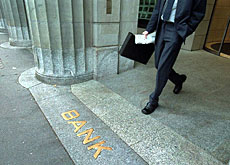Bankers say regulations are stifling them

Private bankers in Switzerland have fired another broadside at what they see as over-regulation in the banking sector.
They say attempts by the authorities to weave an increasingly dense web of rules cannot be ignored.
The private bankers’ position is contrary to that of the Federal Banking Commission, which says banking remains less heavily regulated than many other industries.
Niklaus Baumann, president of the Swiss Private Bankers Association, said on Thursday that the government had 40 projects in the pipeline on rules affecting banks.
Baumann said it was essential to avoid a situation in which regulations dominated the landscape and led to a perception of state-control.
“What the banks need – and the Swiss Bankers Association has made it clear to the Federal Banking Commission – is new management of the regulations and the progressive replacement of disperse measures by a coherent system,” he told a news conference on Thursday in Bern.
Transparency
Baumann said the process of drawing up new regulations should be carried out in a transparent way and open for public debate.
“The banks will contribute to this process not only by offering concrete suggestions, but mainly by giving staff continuing adequate training,” he said.
He argued that the number of regulations affecting the banks also hurt the rest of the Swiss economy.
“An over-regulated economy generally stagnates… and an over-regulated banking sector paralyses the entrepreneurial spirit in other branches of the economy, he added.
Baumann also warned that more red tape might lead to more consolidation among the smaller banks.
“Structural reform caused by over-regulation among smaller establishments is the last thing that we want for Swiss and foreign bank clients.”
“The small banks contribute in a decisive way to the efficiency of the Swiss economy. Structural change would be both irrational and damaging.”
Economic realities
He complained that by introducing new regulations, some government bodies were simply justifying their existence, adding that there was a “growing perfectionism” on the part of lawyers who knew little of economic realities.
“The meekness with which Switzerland modifies its laws as rapidly as possible to conform to international norms and other standards also has perverse effects. We always want to be the best,” he commented.
Baumann said no regulation, however perfect, could protect people against a bank or financial institution that decided to stray outside the rules.
“The few scandals that have emerged over the past few decades have shown that even the most complete legislation could not prevent serious human weaknesses and criminal action,” he added.
Not accurate
His comments were in stark contrast to remarks last April by Jean-Baptiste Zufferey, vice-president of the Federal Banking Commission.
Zufferey said it was not accurate to say that the financial sector was more heavily regulated than any other.
“It is true that it is heavily regulated but a number of quantative studies have shown that it is still subject to less strict regulation than other areas such as food, public health, social security, town planning, construction and protection of the environment.”
He also said it was wrong to claim that Switzerland had more onerous regulation than rival countries as far as banking and finance were concerned.
“If we compare the situation in Switzerland with that of the United States… it is quite clear that it is Switzerland that has the more relaxed regime in terms of regulation and supervision,” he commented.
swissinfo, Robert Brookes
The private bankers represent the oldest form of Swiss banking.
They are usually specialists in asset management.
The Swiss Private Bankers Association has 13 members.
Founded in 1741, Wegelin & Co. of St Gallen is Switzerland’s oldest bank.
The association defines a private banker as “a businessman in the private banking sector, using his own capital to conduct his business, conscious of his unlimited liability and his power to take independent decisions”.
Swiss private bankers have called for a coherent system governing regulations, arguing that the present system is damaging them and the Swiss economy.
On Thursday, the Private Bankers Association expressed strong support for the second set of bilateral accords with the European Union.
It also supports extending an agreement on the free movement of people to the new EU members.

In compliance with the JTI standards
More: SWI swissinfo.ch certified by the Journalism Trust Initiative










You can find an overview of ongoing debates with our journalists here . Please join us!
If you want to start a conversation about a topic raised in this article or want to report factual errors, email us at english@swissinfo.ch.